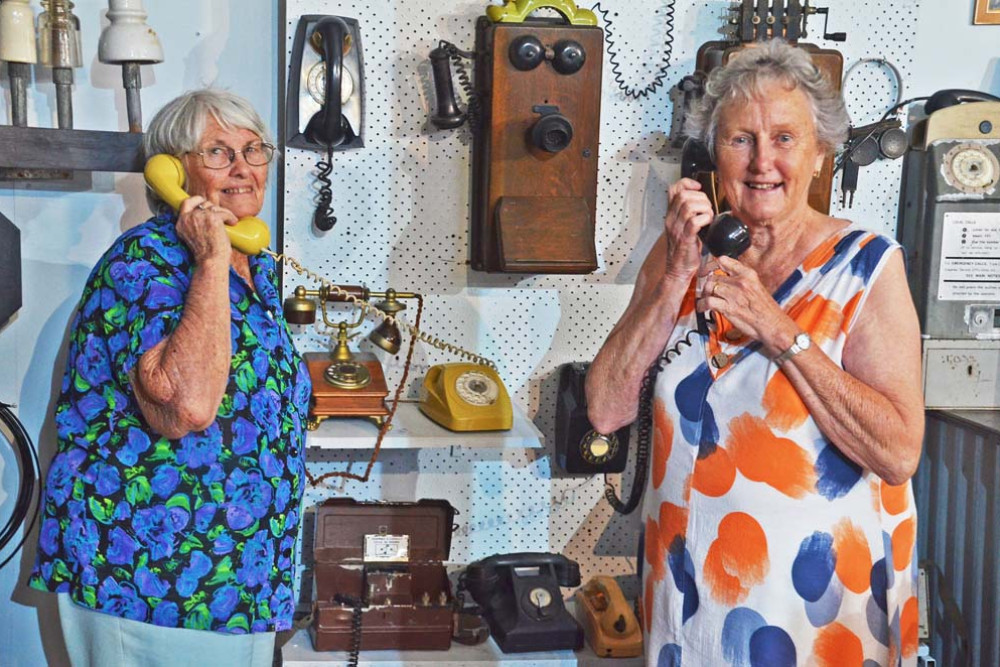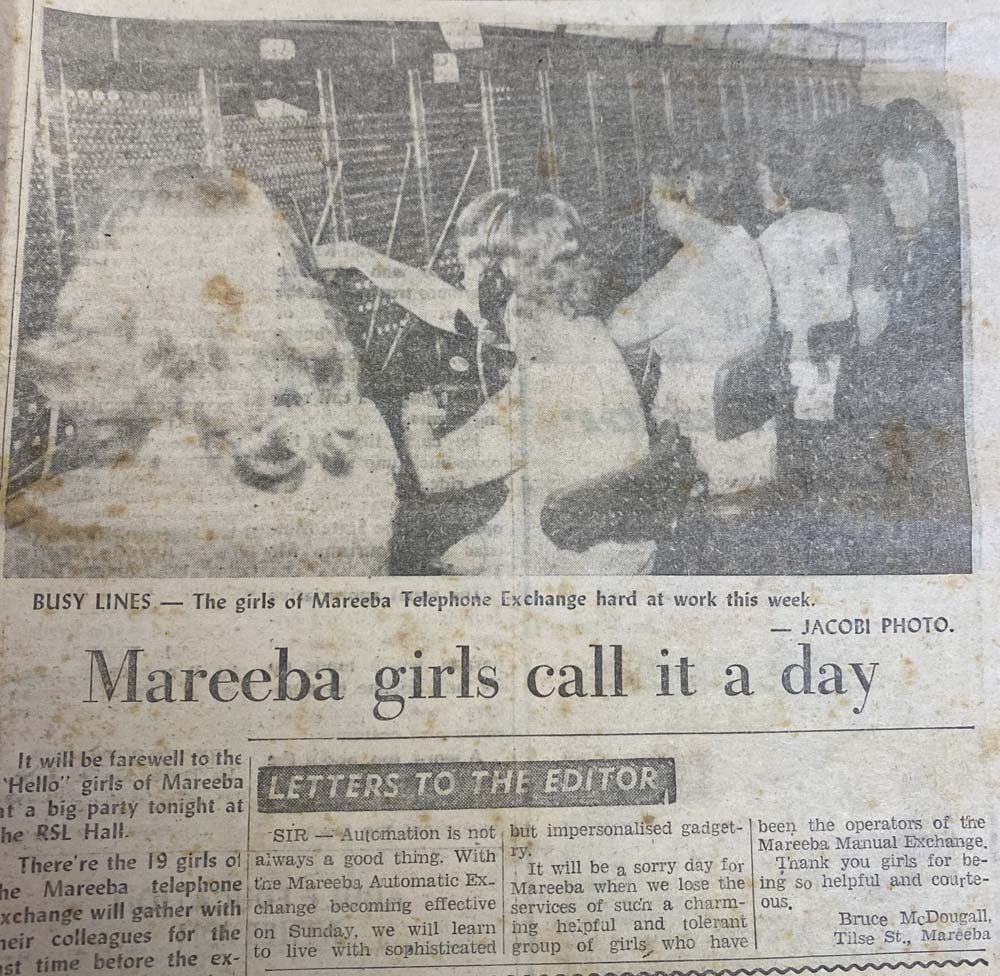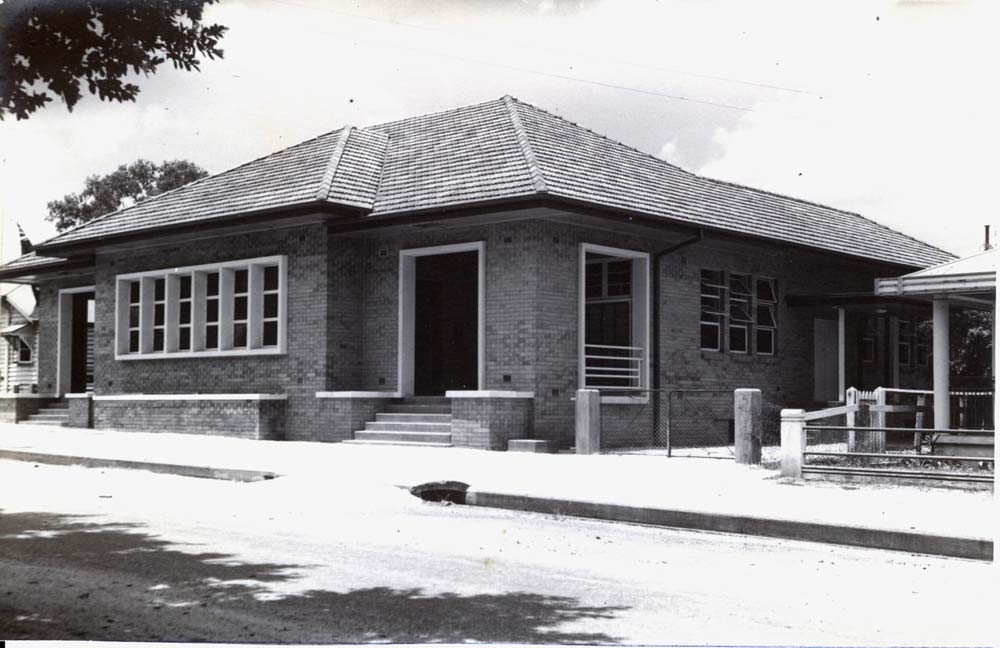Community & Business
18 March, 2025
Keeping up the connection
For Gladys France, Eve-Lyn McGrath, Elaine Evans, Jill Roos, and Carmel Maifredi, the memories of working at the exchange in the old Mareeba post office are still very much alive, and to this day they still meet monthly to catch up.

They are organising a reunion for the whole Mareeba Telephone Exchange next month to mark the half century since the exchange was automated.
“Our job was interesting, very interesting,” Gladys said slyly.
“What happens on the exchange, stays on the exchange,” Carmel added while laughing.
“We were all women working together and we had no arguments,” Elaine said.
“And we still get together every month, 50 years on,” Eve-Lyn added with a smile.
The changeover took place at 6am on Sunday 27 July 1975, leaving the women to move on to a different exchange that was still manual, or to begin a new chapter in their lives.
“On that Sunday, one of our night boys was working that morning, and he reckons they came in, with an axe, cut the cable, and it went from manual to automatic,” Gladys said.
“They cut the cable with an axe! How would you be?”
In the early days of telephony, companies used manual telephone switchboards. Operators would connect calls by inserting a pair of phone plugs into the appropriate jacks.
In Mareeba, the telephone exchange was in the back of the old post office, which is the now empty piece of land in between KFC and the old fire brigade station.
It had three local-call switchboards, and several trunk-call switchboards. Local calls cost 10 cents and trunk calls were timed in three-minute intervals.
“A lot of switchboards back then had shutters, but ours was a modern one with lights,” Jill said.
“When somebody picked up the phone, the light would come on and you plugged into it and said, ‘number please’, then you would transfer them and say ‘connecting’.”
Gladys said: “By the time we finished, we had 1200 numbers on those switchboards, and most of us knew nearly every one of them.
“It was a very important role so the town could have communication.”
“We had to learn all the standard phrases, like ‘number please’, ‘are you extending’, or ‘are you getting through’,” Eve-Lyn said.
“A lot of people would just call up and ask for the paper shop or Cleall’s Butchery, not wanting to look it up, so we would know the number and put them through to where they wanted.”
In its heyday, the exchange had about 20 girls and two monitors working shifts from morning, day, and night, with men typically taking over for the night shifts.
“Number 20 was the police, 1 was the ambulance, 2 was the hospital, 5 was a fire alert, and 13 was the undertaker (funeral parlour),” Gladys explained.
“If you saw that the hospital was ringing the undertaker, you knew someone had died.
“We’d get accidents too, and someone would ring to be put through to the ambulance, then someone else would see the ambulance down the road and ring up and ask what was going on,” she laughed.


Gladys worked at the exchange for 10 years right up until the changeover, and it wasn’t until a few years after she started, that married women were allowed to work in government jobs.
“When I started in 1965; if you got married, you had to finish,” Gladys said.
“So, there was always a turnover from young girls getting married and more coming in to replace them, but they changed that.”
Jill added: “I was there for about four years before I got married, then eight years had gone past, and they begged me to go back.
“My husband kept saying ‘my wife doesn’t need to work’, but I told him they only wanted me for four weeks, they’re stuck. ‘Well only for four weeks’, he said to me.
“I must’ve stayed there for seven or eight years until they went automatic,” she chuckled.
According to the women, it was widely assumed that the telephonists listened in on people’s phone calls and would know all of the gossip in the town.
“No, absolutely not, we were always too busy,” Gladys said.
“Once again, what happens on the exchange, stays on the exchange,” Carmel added.
“We were always under supervision, and very busy,” Jill said.
“People always thought we listened to everyone, but we knew what was going on because we knew who was calling who,” Elaine said.
Gladys continued: “We did have to monitor a call to make sure people were getting through.
“There was a monitoring key, so you switched that over and if you could hear someone talking, you just pulled it back.
“But no, we didn’t listen in on calls, we monitored them,” she said carefully with a grin.
The reunion will be held on Saturday night, 5 April, at the Gateway Hotel, Mareeba, which is opposite the old post office and exchange.
“Entertainment will be if anyone wants to get up and share a story from their days of working in the industry,” Eve-Lyn said.
“Hopefully there’ll be lots of old photos to look at and reminisce about.
“We will also be going to the Heritage Centre for breakfast on Sunday morning because there are people travelling from further afield, so that is open for anyone who wishes to come as well.”
The women are confident they have reached out to everyone who was involved, including post office workers, exchange workers, technicians and linesman.
If you were involved and have not been contacted, or would like more information, call Eve-Lyn on 0439 754 380.


